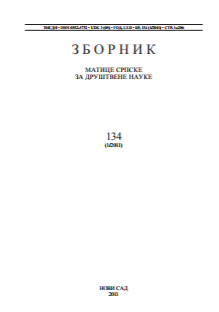ИНТЕРНЕТ У САВРЕМЕНИМ ЕТНОЛОШКИМ И АНТРОПОЛОШКИМ ИСТРАЖИВАЊИМА
THE INTERNET AS A FIELD AND A MEANS IN CONTEMPORARY ETHNOLOGICAL AND ANTHROPOLOGICAL RESEARCH
Author(s): Gordana Blagojević Subject(s): Anthropology, Communication studies, Cultural Anthropology / Ethnology, Culture and social structure , ICT Information and Communications Technologies
Published by: Матица српска
Keywords: Internet technologies; cyber culture; virtual ethnography; ethnography of the Internet; anthropology of the Internet;
Summary/Abstract: Cyber culture (synonyms for this term are: virtual culture, digital culture, net culture and the like) represents a multidisciplinary field of research. This paper focuses on the ways in which contemporary Internet technologies are used in ethnological and anthropological research. While studying cyber culture one needs to take into consideration the relativity of the division into virtual and real. The so-called virtual communities are often more real to their users than certain constructed communities from the so-called real reality. The Internet can be observed as a field and as a means for conducting research. Anthropologists introduced virtual ethnography as a conceptual and methodological approach to studying cyber culture. However, if we speak of actual scientific research, the term virtual ethnography is not an adequate one. The examined contents and communication with examinees are real. The other possible term is ethnography of the virtual world, but this term is not precise enough either, since the ’virtual world’ is not limited only to the Internet. In my opinion, the most adequate terms are ethnography of the Internet and anthropology of the Internet. The Internet as a terrain for ethnological and anthropological research can be observed on several levels. Available information can be used as a data base, but also as material for analysis of existing textual, visual and audio contents. Previous research results show that in analyzing Internet phenomena one needs to take into consideration their physical background as well. Otherwise, the total context is lost. People with many different local identities enter the global cyber space. In this way cyber communities often portray the existing structures of relations. The Internet can be used both for establishing contacts with distance examinees and collecting data by methods of polls (by using electronic mail) and interviews (by using a camera and Skype). Theoretically speaking, a researcher who has access to fast Internet is able to contact examinees from different parts of the world (although they must also have access to the Internet). The advantages and faults of this kind of research conduct are viewed here as compared to research that demands immediate contact with examinees.
Journal: Зборник Матице српске за друштвене науке
- Issue Year: 2011
- Issue No: 134
- Page Range: 17-27
- Page Count: 11
- Language: Serbian

